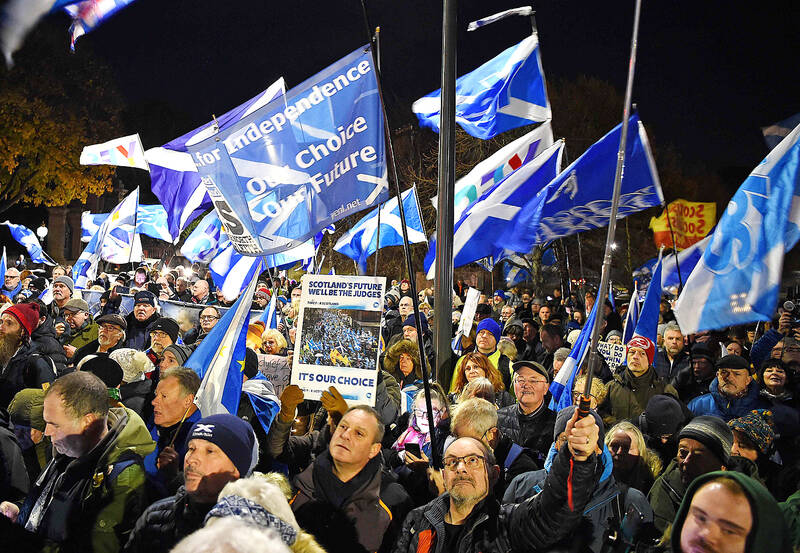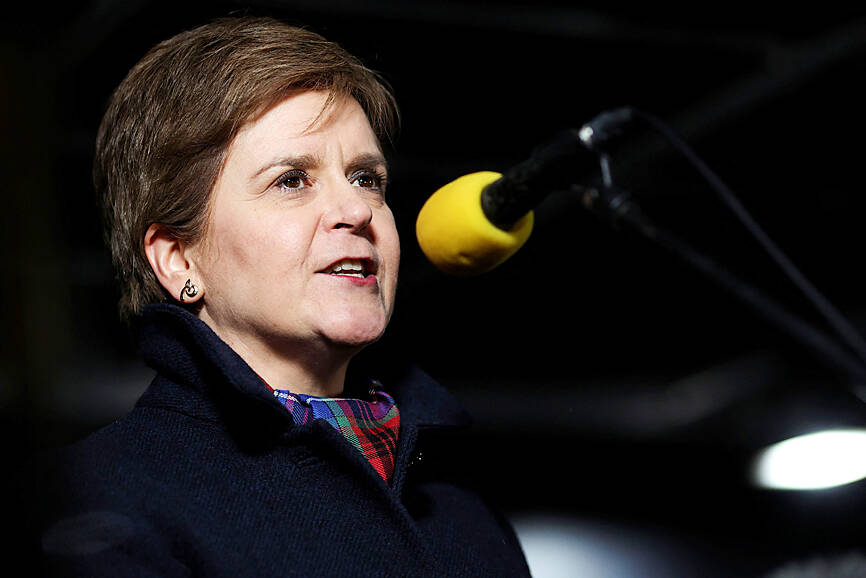Scottish flags were worn like capes — little protection against a chilly evening in Edinburgh on Wednesday, hours after the British Supreme Court ruled that Scotland cannot unilaterally conduct a referendum on leaving the UK — and “Yes” signs strung with lights were waved against the darkening sky.
Anti-Tory placards made an appearance, some recycled from 2014, others with a fresh angle.
“Our colonial status has been confirmed — and the law is an ass,” one placard read.

Photo: AFP
Groups of bagpipers huddled together, warming up their instruments and stopping for a cigarette break.
The Proclaimers were blasted from a stereo on the stage, funded by the Scottish Independence Foundation.
A small, but lively counterprotest across the road shouted over a loudspeaker, calling for the Scottish independence campaign leaders to be put in the dock for treason.

Photo: REUTERS
“The union has worked for 400 years,” said Ronnie Kane, codirector of the pro-union campaign group A Force For Good. “If it ain’t broke, don’t fix it.”
The independence supporters were equally buoyant.
Jim Brack described the ruling as a “win win,” saying: “It has revitalized the situation. We were perhaps getting a bit complacent.”
The unanimous ruling torpedoed the Scottish government’s push to hold a plebiscite in October next year — eight years after Scots narrowly opted to remain in a pre-Brexit UK.
Julia Stryl, 52, agreed that the result would provide a boost to the independence movement.
“[Westminster] hoped the Supreme Court would be neutral. Now, it’s Westminster that’s clearly blocking the democratic right to independence for the Scottish people,” she said.
The crowd on the evening was diverse, with speakers from the US, France, Spain’s Catalonia and elsewhere. The fallout from Brexit was a strong consideration for many who had voted pro-union in 2014, but since changed their mind.
“I regret it,” said Elise Tallaron, who is French and has lived in the UK since 1996. “Even then, I could see strong arguments for independence.”
She is now treasurer for the Yes For EU movement.
It was clear that sentiment against the Conservative Party of British Prime Minister Rishi Sunak, always strong in Scotland, had been gathering force amid the COVID-19 pandemic, Brexit and a cost-of-living crisis.
One placard read: “Scotland can’t afford to be part of the UK.”
British lawmaker Tommy Sheppard of the Scottish National Party (SNP), who took the train from London to attend, declared that Scotland did not need to be “enslaved” to a “decaying, post-Brexit isolationist” union any longer.
David Spacey, 56, believed that Westminster had played the wrong card on a new referendum.
“After the punishment budget, things are getting grim. At the moment the chance of independence is 50/50. [The union] could win it. If they wait, and people get poorer and struggle to pay their bills, support for independence will only increase,” he said.
The crowd cheered loudly when Scottish First Minister Nicola Sturgeon made a surprise appearance.
“Today it has been clarified that the UK is not a voluntary partnership of nations,” she said, adding that the result would create only “temporary relief” for unionists.
“No establishment Westminster or otherwise will silence the voice of the Scottish people,” she said.
Sturgeon faced strong calls from those present to make her proposal for an SNP convention next year a cross-party movement.
Scottish Socialist Party spokesperson Colin Fox said: “Today could be a historic day if independence supporters realize we need a better strategy to beat the forces of British state that bar our way.”
Between speakers, bagpipers provided brief musical interludes. The unofficial national anthem, Flower of Scotland, was sung. One person was taken ill and removed by ambulance. The counterprotest did not let up from the other side of the road.
Lesley Riddoch, an independence campaigner and organizer of the rally, summed up the overall sentiment when she told the crowd: “We may not have yet convinced people that independence is the answer, but certainly Westminster and any belief in Westminster is gone and that is massive progress — and something for us to build on.”
Additional reporting by AFP

Four people jailed in the landmark Hong Kong national security trial of "47 democrats" accused of conspiracy to commit subversion were freed today after more than four years behind bars, the second group to be released in a month. Among those freed was long-time political and LGBTQ activist Jimmy Sham (岑子杰), who also led one of Hong Kong’s largest pro-democracy groups, the Civil Human Rights Front, which disbanded in 2021. "Let me spend some time with my family," Sham said after arriving at his home in the Kowloon district of Jordan. "I don’t know how to plan ahead because, to me, it feels

Polish presidential candidates offered different visions of Poland and its relations with Ukraine in a televised debate ahead of next week’s run-off, which remains on a knife-edge. During a head-to-head debate lasting two hours, centrist Warsaw Mayor Rafal Trzaskowski, from Polish Prime Minister Donald Tusk’s governing pro-European coalition, faced the Eurosceptic historian Karol Nawrocki, backed by the right-wing populist Law and Justice party (PiS). The two candidates, who qualified for the second round after coming in the top two places in the first vote on Sunday last week, clashed over Poland’s relations with Ukraine, EU policy and the track records of their

‘A THREAT’: Guyanese President Irfan Ali called on Venezuela to follow international court rulings over the region, whose border Guyana says was ratified back in 1899 Misael Zapara said he would vote in Venezuela’s first elections yesterday for the territory of Essequibo, despite living more than 100km away from the oil-rich Guyana-administered region. Both countries lay claim to Essequibo, which makes up two-thirds of Guyana’s territory and is home to 125,000 of its 800,000 citizens. Guyana has administered the region for decades. The centuries-old dispute has intensified since ExxonMobil discovered massive offshore oil deposits a decade ago, giving Guyana the largest crude oil reserves per capita in the world. Venezuela would elect a governor, eight National Assembly deputies and regional councilors in a newly created constituency for the 160,000

North Korea has detained another official over last week’s failed launch of a warship, which damaged the naval destroyer, state media reported yesterday. Pyongyang announced “a serious accident” at Wednesday last week’s launch ceremony, which crushed sections of the bottom of the new destroyer. North Korean leader Kim Jong-un called the mishap a “criminal act caused by absolute carelessness.” Ri Hyong-son, vice department director of the Munitions Industry Department of the Party Central Committee, was summoned and detained on Sunday, the Korean Central News Agency (KCNA) reported. He was “greatly responsible for the occurrence of the serious accident,” it said. Ri is the fourth person